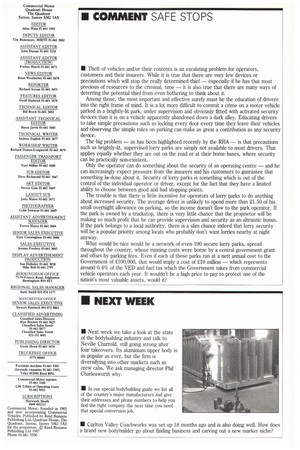• COMMENT SAFE STOPS
Page 5

If you've noticed an error in this article please click here to report it so we can fix it.
• Theft of vehicles and/or their contents is an escalating problem for operators, customers and their insurers. While it is true that there are very few devices or precautions which will stop the really determined thief — especially if he has that most precious of resources to the criminal, time — it is also true that there are many ways of deterring the potential thief from even bothering to think about it.
Among those, the most important and effective surely must be the education of drivers into the right frame of mind. It is a lot more difficult to commit a crime on a motor vehicle parked in a brightly-lit park, under supervision and obviously fitted with activated security devices than it is on a vehicle apparently abandoned down a dark alley. Educating drivers to take simple precautions such as locking every door every time they leave their vehicles and observing the simple rules on parking can make as great a contribution as any security device.
The big problem — as has been highlighted recently by the RHA — is that precautions such as brightly-lit, supervised lorry parks are simply not available to most drivers. That applies equally whether they are out on the road or at their home bases, where security can be practically non-existent.
Only the operator can do something about the security of an operating centre — and he can increasingly expect pressure from the insurers and his customers to guarantee that something is done about it. Security of lorry parks is something which is out of the control of the individual operator or driver, except for the fact that they have a limited ability to choose between good and bad stopping points.
The trouble is that there is little incentive for operators of lorry parks to do anything about increased security. The average driver is unlikely to spend more than 21.50 of his small overnight allowance on parking, so the income doesn't flow to the park operator. If the park is owned by a truckstop, there is very little chance that the proprietor will be making so much profit that he can provide supervision and security as an altruistic bonus. If the park belongs to a local authority, there is a slim chance indeed that lorry security will be a popular priority among locals who probably don't want lorries nearby at night anyway.
What would be nice would be a network of even 100 secure lorry parks, spread throughout the country, whose running costs were borne by a central government grant and offset by parking fees. Even if each of these parks ran at a nett annual cost to the Government of 2100,000, that would imply a cost of 210 million — which represents around 0.4% of the VED and fuel tax which the Government takes from commercial vehicle operators each year. It wouldn't be a high price to pay to protect one of the nation's most valuable assets, would it?




















































































































